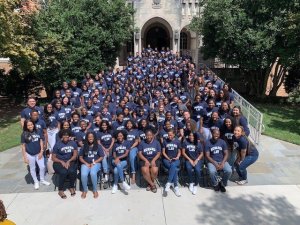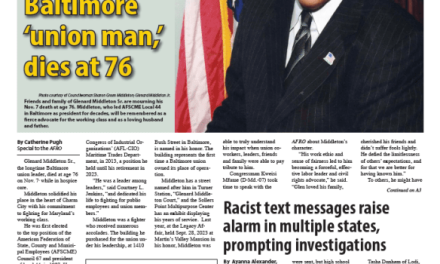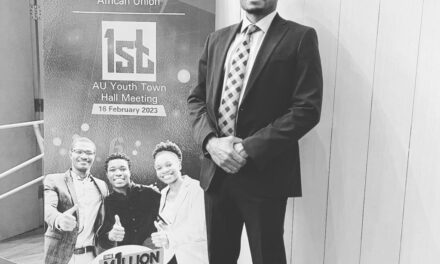By DaQuan Lawrence,
Special to the AFRO
The United Nations (UN) recently held the inaugural sessions of the Permanent Forum for People of African Descent (PFPAD) in Geneva, Switzerland. A delegation of 13 Howard University Law School students presented their research findings at the PFPAD-related side-event, “Acknowledging Black America in the Discussion for Sustainable Development Goals: HBCUs Leading the Way.”
The PFPAD sessions included over 600 delegates from UN member states and civil society who called for the institutional protection of human rights for African descendants world-wide. Howard Law School students assisted the PFPAD by working with grassroots organizations in U.S. cities with substantial Black populations to measure where marginalized Americans are in relation to the Sustainable Development Goals (SDGs).
Jarrius Adams, Amma Boateng, Kierra Booker, David Carter, Ashtyn DeWalt, Charkera Ervin, Kayla Gardner, Dominique Hall, Samantha Jeffrey, Precious Patterson, Talia Thomas, Jessa Royer and Ashley Washaya comprised the Howard Law School Movement Lawyering clinic. Howard students Harun ‘Shaq’ Al-Hijaz and Jy’Mir Starks presented Thomas and DeWalt’s research findings since they were unable to travel with the Howard delegation.
The students were led by Justin Hansford, Howard University School of Law professor, the founder and executive director of the Thurgood Marshall Center for Civil Rights (TMCRC), and the U.S. candidate for PFPAD.
Established in August 2021, the forum will serve as an advisory body to the UN Human Rights Council and operate as “a consultative mechanism for people of African descent and other relevant stakeholders” and “platform for improving the safety and quality of life and livelihoods of people of African descent”.
The event was moderated by Jadayah Spencer, International Youth Leadership Institute, executive director, along with Vickie Casanova-Willis of the Office of HBCU Development International Cooperation and Hansford.
U.S. Permanent Representative to the UN Human Rights Council, Ambassador Michèle Taylor, and Desirée Cormier Smith, the U.S. Special Representative for Racial Equity and Justice in U.S. history, addressed the gathering.
“To achieve progress, we must listen to those most affected…and engage on issues they deem important, such as the right to education” said Taylor. “I was excited to hear from the Howard Movement Lawyering clinic, because I think I learned how I can do my job better,” she said.
“Our clinic consisted of individual and group work and was challenging, but I enjoyed contributing and editing our PowerPoint,” said Samantha Jeffrey, who is studying telecommunications, corporate litigation and tax at Howard.
“We conducted town halls or roundtable discussions to gather qualitative and person-centered data that could not be found in peer-reviewed or government funded quantitative data; then drafted a report of our findings and recommendations,” Jeffrey said, as she addressed the SDGs in Washington, D.C.
In an extraordinary sequence the law students skillfully discussed the measurement of SDG indicators for marginalized populations in Antioch, Calif.; Baltimore, Md; Chicago, Ill.; Durham, N.C.; Houston, Texas; Jackson, Miss.; Los Angeles, Calif.; Miami, Fla.; New York, N.Y.; Newark, N.J.; Omaha, Neb.; Pittsburgh, Pa.; and Washington, D.C.
“I chose Washington, D.C. because I have lived here my entire adult life, and it is my permanent home. I have always been aware of the District’s racial inequities appalling to research and view the quantitative data proving it,” Jeffrey said.
Carter, a third year law student, also spoke with the AFRO.
“Although our work has been shared with the public, we had the fortune of presenting our findings in front of the Amb. Taylor, Special Rep. Smith and other members of the U.S. delegation in Geneva, it’s important that the work we’ve done does not stop here,” said Carter.
Special Rep. Smith spoke about U.S. foreign policy goals.
“I was appointed to ensure that U.S. foreign policy advances the human rights of members of marginalized racial and ethnic communities, and is working to counter structural racism, discrimination and xenophobia,” Smith said. “Your work empowers those who face barriers to political, social and economic inclusion. Students do the hard but necessary work of research and reporting in order to demand accountability from elected leaders and public servants.”
The event was organized by the TMCRC at the Howard University School of Law, the Office of HBCU Development International Cooperation as well as the International Civil Society Working Group for PFPAD and International Youth Leadership Institute.
“We’re very proud of our clinic and the work our students have done and continue to do,” said Hansford. “They’re the future leaders of, not just Black America, but America and the global community.”
Help us Continue to tell OUR Story and join the AFRO family as a member –subscribers are now members! Join here!
The post Howard Law students assess United Nations’ progress on sustainable development goals appeared first on AFRO American Newspapers .











